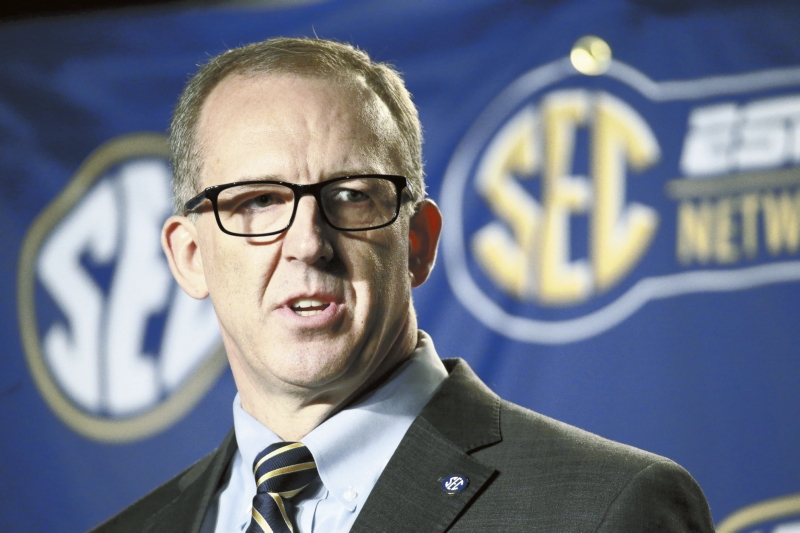Sankey refuses to step down in UNC fraud case
Published 1:14 am Saturday, April 22, 2017

- FILE - In this March 13, 2015, file photo, Southeastern Conference Commissioner Greg Sankey speaks before an NCAA college basketball game in Nashville, Tenn. Sankey has denied a request seeking his removal as head of the NCAA infractions panel handling North Carolina’s ongoing academic case because of a conflict of interest. Sankey stated in an April 14 letter obtained by The Associated Press that the panel would “fairly decide this case.” UNC faces five top-level charges, including lack of institutional control, in the multiyear probe centered on irregular courses in an academic department.(AP Photo/Mark Humphrey, File)
By Aaron Beard
AP Sports Writer
RALEIGH (AP) — Southeastern Conference Commissioner Greg Sankey has denied a request seeking his removal as head of the NCAA infractions panel handling North Carolina’s ongoing academic case because of a conflict of interest.
Sankey stated in an April 14 letter obtained by The Associated Press that the panel would “fairly decide this case.”
“The panel, including me, will hear and decide this case based on the case record and the membership’s bylaws,” Sankey wrote to all involved parties.
Elliot Abrams — a Raleigh attorney representing a retired office administrator charged with violations — had written the NCAA saying Sankey had a “personal, professional and institutional interest” in the outcome as SEC commissioner while comparing it to “refereeing a championship game between an (Atlantic Coast Conference) team and an SEC team.”
UNC faces five top-level charges, including lack of institutional control, in the multiyear probe centered on irregular courses in an academic department.
The case stalled in March after Abrams wrote the NCAA to say his client, Deborah Crowder, was willing to talk with investigators for the first time. Crowder, who graded many of the papers for problem classes, filed an affidavit defending the courses’ quality.
In his letter last week to the NCAA, Abrams said a third Notice of Allegations outlining revised charges against Crowder and UNC should be tossed out as the result of “inappropriate pressure from a conflicted hearing panel.” He also said an “arbitrary” April 14 deadline for Crowder’s interview wouldn’t allow adequate preparation for questions about years-old documents.
Sankey responded that Crowder’s interview should occur in coming weeks within the new schedule, adding: “There will be no further delays, and the case will be heard on this schedule.”
Sankey also referenced “misstatements of facts” in Abrams’ letters while reiterating investigation details must remain confidential.
“The NCAA claims that no appearance of a conflict of interest exists and that the hearing panel did not direct the enforcement staff to issue the third Notice of Allegations,” Abrams said in a statement to the AP. “Interestingly, the NCAA attempts to keep these assertions from public view, even though its letter is plainly a public record.
“These positions intensify our concerns that the NCAA does not feel bound by its bylaws and that this process is merely a show designed to reach a predetermined result. Nevertheless, Ms. Crowder looks forward to correcting the record by giving an interview in the next few weeks.”
The NCAA Committee on Infractions issued a statement Friday to the AP on Friday saying that “committee composition is appropriate.”
“Rules put in place and supported by our membership call for confidentiality in infractions cases and the continued leaks of partial and inaccurate information in this case are disappointing,” the committee stated.
In an email to the AP, UNC spokeswoman Joanne Peters said the school will make its case to the panel according to the NCAA’s schedule.
Sankey’s letter also details a new timetable of completion for the oft-delayed case. UNC must respond to the latest charges by May 16. The NCAA enforcement staff then has until July 17 for its own response. Sankey wrote that his panel will hear the case in August with “anticipated” dates of Aug. 16 and 17.
Rulings typically come weeks to months later, meaning the case could reach a long-awaited resolution by the end of 2017 — assuming there are no more of the delays and snags that have plagued the case so far.
The focus of the case is independent study-style courses misidentified as lecture classes that didn’t meet and required a research paper or two in UNC’s formerly named African and Afro-American Studies (AFAM) department. They featured significant athlete enrollments and typically high grades.
The case is an offshoot of a 2010 probe into the football program. The NCAA reopened its investigation in summer 2014, filed charges in May 2015, revised them last April and again in December.
In his April 4 letter seeking Sankey’s removal, Abrams cited the “appearance of partiality” from an NCAA conflicts-of-interest bylaw. Abrams added Sankey could be a witness regarding an Auburn case featuring similarities while Sankey was an SEC associate commissioner. The NCAA investigated claims a sociology professor helped athletes stay eligible through independent studies in 2005 and 2006 but found no major violations.
Abrams later sought details of communication between the NCAA and former U.S. Justice Department official Kenneth Wainstein during Wainstein’s 2014 AFAM investigation. Crowder cooperated with that probe, which estimated more than 3,100 students were affected between 1993 and 2011, with athletes across numerous sports accounting for roughly half the enrollments.
In his letter, Sankey responded that saying he “previously investigated (an SEC) institution on an academic matter” was inaccurate but didn’t address the Wainstein inquiry.
___
Follow Aaron Beard on Twitter at http://www.twitter.com/aaronbeardap





